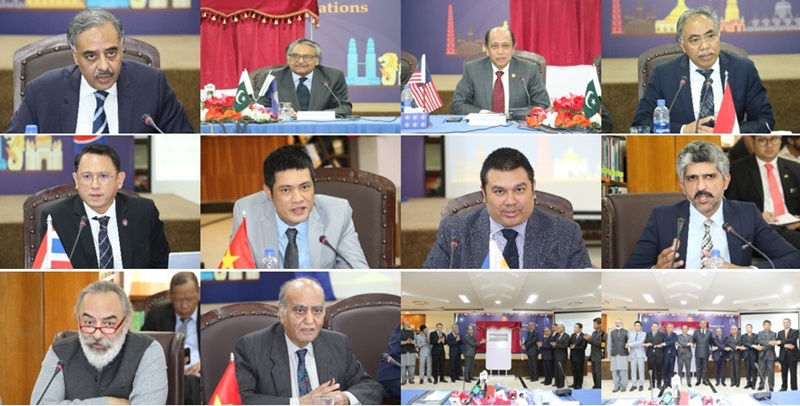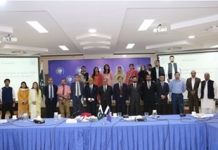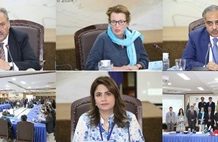Press Release
Pakistan – ASEAN partnership affirmed as Foreign Minister Inaugurates ‘ASEAN CORNER’ AT ISSI

Foreign Minister Jalil Abbas Jilani unveiled the plaque and inaugurated the ‘ASEAN Corner’ at the Institute of Strategic Studies Islamabad (ISSI) today. The event was characterized by ASEAN Envoys as a “milestone” in the growing Pakistan-ASEAN collaboration. The inauguration was followed by a Round Table discussion, entitled: “Forging Partnership: Exploring the Future Prospects of Pakistan-ASEAN Relations.”
The inauguration ceremony and Round Table attracted prominent diplomats, scholars, students, media, and businessman representatives, and served as an opportunity to underscore ASEAN’s place and role in the world and to reinforce the efforts strengthening of Pakistan-ASEAN partnership.
In his remark at the outset, DG ISSI Ambassador Sohail Mahmood extended a warm welcome to all the participants and thanked the Foreign Minister and ASEAN Heads of Missions for their personal participation. He highlighted the significance of the ‘ASEAN Corner’, which as an idea was first conceived in the ISSI-ACI (ASEAN Committee in Islamabad) meeting in January 2023. Amb. Sohail Mahmood noted the strong historical and cultural ties between the people of Pakistan and ASEAN region and outlined the evolution of Pakistan-ASEAN relations over the past several decades. He added that besides increasing trade and investment ties, Pakistan was keen on strengthening hard and soft connectivity between the two sides. In this context, exploring the potential of Regional Comprehensive Partnership (RCEP) and China Pakistan Economic Corridor (CPEC) was of crucial importance. He added that full dialogue partnership with ASEAN remained a distinct objective for Pakistan. He further added that the print and digital resources provided at ‘ASEAN Corner’ would help academics and practitioners alike and, hopefully, engender more strategic insights into the region, promote an informed discourse, help formation of well-considered recommendations, and facilitate forward-looking diplomatic initiatives for Pakistan’s enhanced engagement with ASEAN.
In his remarks, H.E. Mohammad Azhar Mazlan, High Commissioner of Malaysia and ACI Chairman expressed gratitude to all those in attendance. He highlighted the deepening relations between Pakistan and ASEAN and underscored the success and achievements of ASEAN as a regional organization. He stressed that ways should be explored for deepening Pakistan-ASEAN relations in the three pillars of political-security, trade-economic, and socio-cultural.
In his Keynote Address, Foreign Minister Jalil Abbas Jilani reaffirmed Pakistan’s commitment to its special relations with the ASEAN member states. He stressed the need for common solutions to shared challenges, including climate change and terrorism. He drew parallels between the success of ASEAN and the potential for Pakistan, highlighting the importance of initiatives like the ‘ASEAN Corner’ in fostering cooperation.
Foreign Minister Jilani highlighted the importance of a peaceful and stable Asia Pacific and emphasized that Pakistan was ready to collaborate with ASEAN states in achieving the goals of confidence-building and conflict prevention. The Foreign Minister also reaffirmed Pakistan’s support for an international order based on principles such as peaceful coexistence, amicable dispute resolution, win-win cooperation, and shared prosperity.
Foreign Minister Jilani noted that Pakistan was actively engaged with ASEAN in various areas, including conducting courses on finance and banking. He expressed regret over the South Asian Association for Regional Cooperation (SAARC) not realizing its potential due to regional politics, particularly India’s policies. The Foreign Minister pointed out that Pakistan faced a range of challenges, including economic, demographic, and climate-related issues, as well as the need to create job opportunities for its young population. In this context, he stressed the importance of meaningful cooperation among countries worldwide to promote sustainable economic growth.
The Foreign Minister underlined that for socio-economic development, peace and security were the fundamental pre-requisites. As such, Pakistan’s foreign policy priorities for its neighbourhood and the wider region were centred on conflict resolution and development. Foreign Minister Jilani emphasized the need to avoid bloc politics and geopolitical constructs that did not align with the unique geographical, historical, and cultural realities of the regions spanning the Indian and Pacific Oceans. As a proponent of multilateralism, he said, Pakistan reiterated its commitment to the fundamental principles of the United Nations charter. The Foreign Minister underscored Pakistan’s continued dedication to ASEAN, reaffirming the objective of full dialogue partnership with ASEAN. Pakistan remains committed to being a strong partner in efforts to promote peace, stability, and development in the region, he concluded.
The inauguration of the ASEAN Corner was followed by a Roundtable Discussion moderated by Dr. Talat Shabbir, Director CPSC, ISSI. Dr. Talat Shabbir highlighted the common security and economic partnerships between Pakistan and the ASEAN. He outlined the event’s purpose, which aimed to shed light on shared challenges and prospects.
Ambassador Adam M. Tugio, Ambassador of Indonesia, said that a three-pronged approach for Pakistan and ASEAN was needed to mutually benefit, focusing on common interests and collaboration in areas like economy, information technology, and sustainable development goals. He encouraged intellectual exchanges through visits by Pakistani think tanks experts to the ASEAN events and frequent exchanges between relevant counterparts.
Ambassador Nguyen Tien Phong, Ambassador of Vietnam, emphasized the potential for increased research and collaboration between the ASEAN and Pakistan. He pointed to the vast population and market potential of the ASEAN, especially in a post-COVID-19 world.
Dr. Muhammad Shoaib, Assistant Professor, National Defence University, Islamabad, stressed the need for academic and policy collaboration, including cultural linkages and ease of travel for mutual engagement. He called for learning from the ASEAN experience in addressing common challenges.
Ambassador Chakkrid Karachaiwong, Ambassador of Thailand, highlighted the diversity within the ASEAN as a strength and proposed areas of cooperation with Pakistan, including cyber security, cultural tourism, and technology. He saw potential in Pakistan’s technology sector and emphasized the importance of addressing challenges and realizing opportunities.
Mr. Juan Paolo Alix, Chargé d’ Affaires of the Philippines, reflected on the longstanding relations between Pakistan and the Philippines, emphasizing shared values and a commitment to peace. He encouraged research excellence at the ‘ASEAN Corner.’
Ambassador Ameer Khurram Rathore, Additional Secretary at the Ministry of Foreign Affairs (MOFA), emphasized the importance of combining practical diplomacy with research endeavours of the academia and think-tanks. He highlighted the millennia-old relationship between Pakistan and the ASEAN and called for deeper security and economic cooperation. Initiatives like counter-terrorism consultation, transnational crime consultation, and promoting business-to-business (B2B) and people-to-people (P2P) interactions were highlighted in this regard.
Ambassador Khalid Mahmood, Chairman BoG, ISSI, presented the Vote of Thanks and expressed optimism about the collaboration between Pakistan and the ASEAN, highlighting the potential for cooperation in traditional and non-traditional areas. He underlined the significance of the ‘ASEAN Corner’ in promoting economic collaboration, connectivity, and cultural exchanges, with a special focus on the Gandhara civilization.











